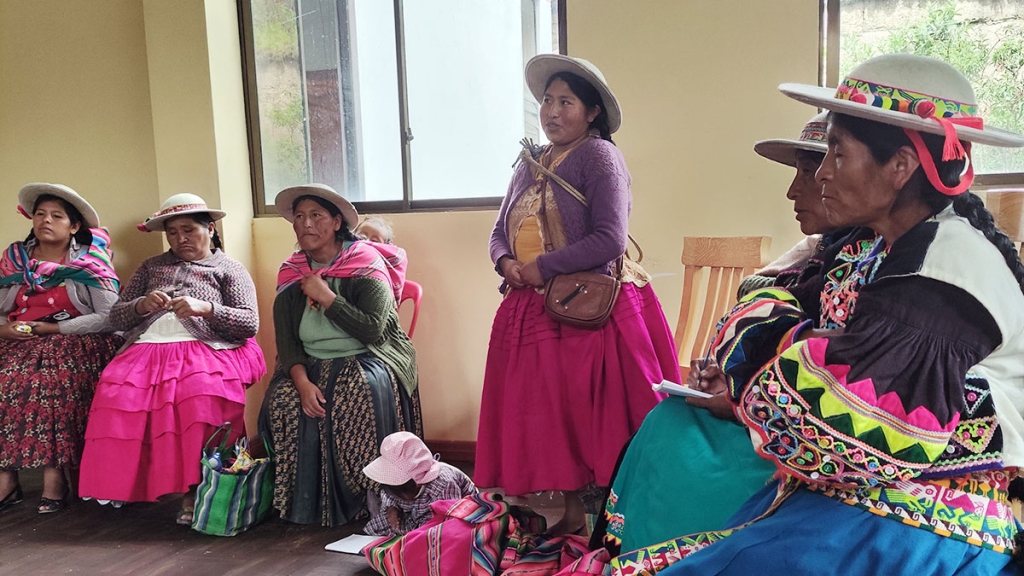
INT’L DAY OF RURAL WOMEN: Salesian Missions highlights projects that empower rural women
Programs strive to empower young women and girls by providing education and training.
NEW ROCHELLE, NY (Oct. 15, 2024) Salesian Missions, the U.S. development arm of the Salesians of Don Bosco, joins humanitarian organizations and countries around the globe in honoring International Day of Rural Women, which is celebrated each year on Oct. 15. This day, which was first established in 2008, recognizes “the critical role and contribution of rural women, including Indigenous women, in enhancing agricultural and rural development, improving food security, and eradicating rural poverty.”
Women make up more than 40% of the agricultural labor force in developing countries, ranging from 20% in Latin America to 50% or more in parts of Africa and Asia, but they are less than 15% of the landholders worldwide, according to the United Nations.
The United Nations has noted, “Women account for a substantial proportion of the agricultural labor force, including informal work, and perform the bulk of unpaid care and domestic work within families and households in rural areas. They make significant contributions to agricultural production, food security and nutrition, land and natural resource management, and building climate resilience. Even so, women and girls in rural areas suffer disproportionately from multi-dimensional poverty. They may be as productive and enterprising as their male counterparts but are less able to access land, credit, agricultural inputs, markets, and high-value agri-food chains and obtain lower prices for their crops.”
Salesian missionaries living and working in more than 130 countries are focused on achieving gender equality through programs targeted specifically for young women and girls. These programs strive to empower young women and girls by providing opportunities for education and training that lead to livable wage employment.
“Through education and skills training and ensuring equal access to social programs, Salesian missionaries empower rural women in countries around the globe,” said Father Michael Conway, director of Salesian Missions. “Ensuring access to education empowers women to develop a reliable source of income for their families and contribute in meaningful ways to their communities.”
In honor of the International Day of Rural Women, Salesian Missions is proud to share some Salesian projects that empower rural women.
BOLIVIA
Through Bosco Global’s “Deconstructing inequality on behalf of the rights of Indigenous women in the province of Muñecas” project, 80 Indigenous women have taken part in training courses in Bolivia. The project is supported by Generalita Valenciana, the government institutions of the Spanish autonomous community of Valencia.
The project, which is taking place in the municipalities of Ayata, Chuma and Aucapata, focuses on empowering women. Two training workshops were organized in February. One workshop focused on “Leadership, self-care and social spaces” and the other on “Shared responsibility in the home.” The trainings were with the collaboration between Bosco Global and Machaqa Amawta Foundation, along with the Federation of Bartolina Sisa Indigenous Peasant Women.
The training respected the women’s customs and culture and tried to deconstruct stereotypes women face regarding self-esteem and self-care that they perceive as inherent to their situation.
ECUADOR
The María Auxiliadora Formation Center in Ecuador has held training initiatives for more than 270 people in 2024, up from more than 130 participants in 2023. Most of the training is aimed at women in the province of Esmeraldas who face unemployment, lack of resources, gender violence and abandonment, or who are heads of household. The training is taught by three lay professionals and includes 12 courses over six employment sectors.
A Salesian explained, “Providing this training has allowed women to gain the skills needed for employment. Some are able to find jobs after the training while others start a small business of their own. Most importantly, they are able to earn an income to become self-sufficient.”
The center was launched 10 years ago in the San Rafael Valley, in the province of Esmeraldas, with the collaboration of the Salesian Ecuador Project and the Salesian San Juan Bosco Community in Esmeraldas. The mission was to support vulnerable populations in a a place marked by violence, drug trafficking, poverty and lack of opportunities.
NIGERIA
Salesian missionaries in the Imo state of Nigeria had the funding to help local farmers thanks to donor support from Salesian Missions. The project “Post-COVID empowerment through the provision of poultry and farm crops for poor young people and women in Nigeria” supported four poor families with their farms in 2022.
These families had established small-scale farms and saw improved revenues at harvest time given the training and support received from the Salesians. Training topics included crops, organic manure, pest control and spacing of crops. Additional training was provided directly at the farm locations, and it included clearing, mapping and planting periods.
One Salesian involved with the project noted, “The project has immensely boosted the morale and determination of the beneficiaries. The funds received have greatly supported and enhanced the farm activities, especially the capacity and new knowledge they have received. Now the people are equipped with skills, knowledge, and capacity to improve their farms and revenues. They have better knowledge of farm management and will be able to improve on their harvest for the years ahead.”
RWANDA
Don Bosco Muhazi Technical-Vocational School, in the Gasabo district in the Kigali province of Rwanda, offered a new agricultural course for young single mothers living with their parents. The goal was to empower women and help provide support for the most vulnerable. The project also aimed to strengthen gender equality in education and in the agriculture business.
There were 25 students enrolled in the initial phase of the course, which lasted six months. Most students were from the Gasabo and Gicumbi districts. Students received a kit to attend the course, which contained overalls, shoes, hoes, rakes, spades, sprayers, soaps and seeds for cultivation.
The students learned how to prepare the fields for planting bananas, tomatoes, peppers and onions. They also learned about animal husbandry.
###
Contact: [email protected]
